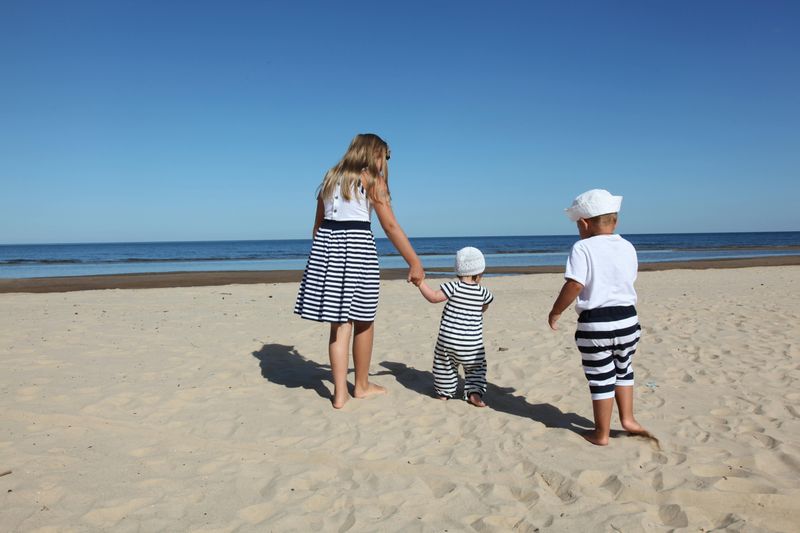12 Things You Only Understand If You Were the ‘Responsible’ Sibling

If you were the reliable one growing up, you already know responsibility isn’t a hat you wear—it’s a whole wardrobe. You became the walking calendar, the household tech support, and the emotional shock absorber before you learned algebra.
This list will hit disturbingly close to home, right down to the way you still triple-check the stove. Keep reading if you’ve ever been praised for being “mature,” then handed a situation no kid should’ve had to manage.
1. You Were the “Third Parent” Before You Were Even a Teenager

Bedtime negotiations and snack diplomacy were your after-school extracurriculars long before anyone asked your permission. You mastered the art of soft compromises, like swapping screen time for pajamas without sparking a revolt. There’s a special kind of patience built from tying shoelaces while reciting spelling words. You learned to calculate the risk of a tantrum like an air-traffic controller.
“Can you just watch them for a minute?” became the unofficial family motto. The minute stretched into hours, then into years of quiet competency. You carried spare Band-Aids, tissues, and an unwavering sense of duty like a utility belt. No one trained you, but you collected hacks from trial and error.
When your friends complained about chores, you nodded politely and kept your history to yourself. They had tasks; you had responsibilities. The difference echoes in muscle memory: you still listen for small footsteps at night.
2. Family Plans Secretly Revolved Around Your Schedule

Calendar invites bowed to your exams, rehearsals, and big games like planets orbiting a tiny sun. Dinner time slid, carpools reshuffled, and weekend plans morphed whenever your commitments chimed. It wasn’t ego; it was logistics—if you were out, the system lost its linchpin. Everyone learned the hard way that chaos spreads when the planner is unavailable.
Flexibility became your family’s unofficial core value, and you were both the reason and the manager. You learned to send reminders, color-code events, and negotiate time slots with precision. It felt flattering and exhausting in equal measure. Responsibility came wrapped in deference and dependency.
Even now, group trips wait for you to confirm before anything gets booked. You’re the human green light. Somewhere between gratitude and expectation lies the unspoken truth: they planned around you because you made everything run.
3. You Got in Trouble for Things Your Siblings Did (Because You ‘Should’ve Known Better’)

Blame traveled uphill in your house like smoke seeking the ceiling. A spilled juice or broken vase somehow turned into a seminar about leadership and vigilance. You heard the phrases “set a good example” and “keep an eye on them” so often they etched grooves in your brain. Accountability became a second skin, even when it didn’t fit.
It taught you to anticipate disasters before they happened, scanning rooms for hazards like a bouncer at a toddler nightclub. You learned to defuse mischief with snacks, distractions, and strategic timing. The unfairness stung, but it sharpened your instincts. You began measuring success by crises averted rather than praise received.
As an adult, you still apologize for things you didn’t cause. The reflex is hardwired: if something goes wrong, you own it first. Old scripts have long half-lives in responsible minds.
4. You’ve Been the Default “Emergency Contact” Since High School

Forms at school, doctors’ offices, and sports camps all knew your name by heart. When something went sideways, your phone buzzed first—lost lunches, forgotten cleats, sudden fevers. You became the dispatcher, coordinating rides and solutions with quiet efficiency. Calm voices and quick decisions were your unofficial electives.
There’s a thrill and burden in being the person everyone trusts in a pinch. You learned to keep your ringer on and your bag stocked with backup snacks, chargers, and a pen. No one declared you the safety net; you just started catching things. Reliability grew its own gravity.
Now your contacts list reads like a small city’s utility map. You know who can jump-start a car at midnight and who owes you a favor. Being the call people make is flattering, but it rarely lets you turn off.
5. You Were the Built-In Mediator for Every Family Argument

Refereeing became instinctive long before you learned the vocabulary of conflict resolution. You could spot the spark before the fire: a slammed cabinet, a tight jaw, a tiny sigh. Sometimes you translated emotions into practical steps—“Let’s take five, then revisit.” Other times, you tossed in humor like a wet blanket on embers.
That role trained your ears to catch subtext and your eyes to read the room. You learned when to be neutral and when to validate, when to redirect and when to stand firm. It made you diplomatic, but it also made you tired. Peacekeeping is careful, invisible labor.
These days, people praise your tact at work without knowing its origin story. Mediation became muscle memory, developed in kitchens and minivans. You still carry tissues and compromise in your back pocket, just in case tempers rise.
6. You’re the Only One Who Knows Everyone’s Important Dates and Details

Birthdays, orthodontist appointments, allergy notes, and the dog’s medication schedule live inside your head rent-free. Reminders shoot from your phone like confetti cannons before any deadline. People call you the organized one, but it’s more like you became the server hosting the family’s data. If the system goes down, so does everyone’s memory.
Color-coded calendars and labeled folders weren’t a hobby; they were survival tools. You learned to build redundancy: reminders for the reminders, screenshots of confirmations, backups in the cloud. It looks impressive from the outside, but internally it’s a humming machine that never powers off. Precision is your peace treaty.
When someone asks, “When is Grandma’s appointment?” your mouth answers before your brain catches up. Knowing, tracking, nudging—it’s a choreography you perform without music. The applause is a brief “thanks,” then onto the next thing.
7. You Overthink Every Decision Because You Were Trained to “Make the Right Choice”

Commitments feel like chess moves when you’ve been told your choices ripple through everyone else. You learned to forecast outcomes, rehearse conversations, and create plan B through F before saying yes. Spontaneity never stood a chance against risk assessments. The stakes always sounded high, even for small things.
Being careful became your brand, and sometimes your cage. You scan for potential harm like a lighthouse, sweeping the horizon for hidden rocks. It’s useful, but it steals ease. Friends call you wise; you know it’s muscle born of pressure.
These days you practice choosing without briefing the entire board of directors in your head. The world doesn’t crumble when you try something messy. But the habit remains: you still run simulations in silence, just to be sure the floor won’t drop out.
8. Vacations Weren’t Relaxing—They Were Logistical Missions

Travel meant spreadsheets, packing cubes, and a backpack that could birth snacks on command. You knew where the passports lived, which gate you needed, and how to entertain a restless child with a paper cup and a story. Your brain mapped bathrooms and snack stands like a general planning a campaign. Rest became a reward for flawless execution.
The family marveled at how smooth everything went without noticing the invisible scaffolding. You held the itinerary like a secret spell, reshuffling plans when delays hit. Even pool time demanded rotations and sunscreen alarms. Fun had checkpoints, and you hit every one.
Now, vacations require unlearning. You’re trying to let the day wander, to trust that missed turns can become memories. Still, you count heads automatically at crosswalks. The mission control switch is stubborn; it clicks on with sunshine.
9. You Felt Guilty Any Time You Put Yourself First

Self-care sounded suspicious when your value had always been measured in usefulness. Saying no felt like breaking a social contract you never signed. You learned to scan other people’s needs before your own, even when your energy hit empty. Guilt slid in like a late guest who never leaves.
There’s a tender bravery in choosing yourself when your training says don’t. You practice tiny rebellions: a quiet morning, an unreturned text, a purchase without justifying it. The world doesn’t collapse, but the habit argues loudly. It takes repetition to soften the volume.
When you finally rest, your body thanks you in languages you forgot you spoke. Boundaries become a kind of love poem to your future self. You’re learning that caring for others and caring for yourself don’t have to duel.
10. Your Parents Shared Adult Problems with You Way Too Early

Money stress, health scares, and relationship storms slipped under your bedroom door before curfew. You were the designated confidant, praised for maturity while absorbing weight meant for adult shoulders. Empathy bloomed early, and so did vigilance. You learned to hold heavy stories without dropping your own.
Being “old for your age” looked noble from the outside, but it rewired your nervous system. You listened for keys in the lock, voices in the hallway, the pause that hinted at trouble. Comforting became your currency; you paid generously. The cost arrived later as tight chests and careful smiles.
Now you set gentle limits around what you can hold. You’re allowed to be loving without being the vault. Maturity still serves you, but you keep a door open for your younger self to breathe.
11. You’re Still the One Everyone Calls When Life Falls Apart

Breakups, lost jobs, flat tires, and childcare gaps all somehow route to your number. You answer with that steady voice, the one that calms storms and finds tow trucks. People say, “I knew you’d know what to do,” and they’re right, which is its own trap. Competence attracts emergencies like porch lights attract moths.
You’ve built a mental rolodex of solutions: spare guest key, jump-start kit, late-night soup recipe, therapist recommendations. It’s a beautiful kind of preparedness, born of care and repetition. Still, you’re learning to ask, “Do you want advice or just an ear?” Boundaries are part of the toolkit now.
When the crisis ends, you exhale in quiet rooms and let the adrenaline drain. The phone will ring again. You hope it’s for good news next time, but you’ll answer either way.
12. Now You Struggle to Relax Because Being ‘On’ Feels Normal

Silence doesn’t read as peaceful when your nervous system equates calm with “check again.” Your mind scans for to-dos like airport radar: unattended bags, unreturned calls, unwatered plants. You aren’t anxious for no reason—you were trained to be the alert one. Stillness asks for trust you’re still learning to give.
Downtime becomes a practice, not a default. You build rituals: a walk without earbuds, a timer that says “enough,” a hobby with no measurable outcome. The first few tries feel itchy. Then the itch becomes a soft hum.
On good days, you notice the quiet is holding you, not accusing you. You breathe like someone who deserves oxygen without earning it. And that’s the secret epilogue to responsibility: you can be safe, even when you’re not on duty.

Comments
Loading…